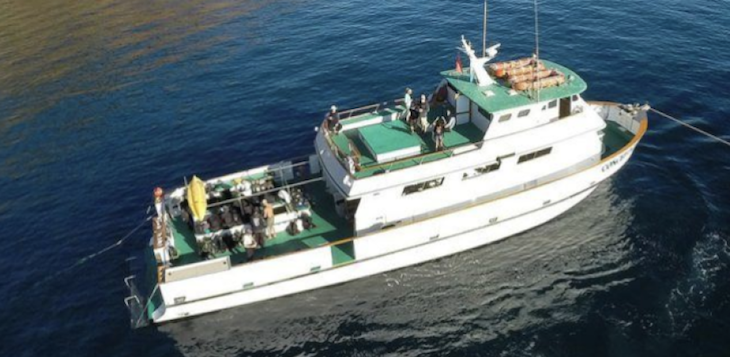The Conception dive boat that caught fire on September 2, 2019 and killed 34 people on board (Photo: Truth Aquatics)
By edhat staff
A new lawsuit has been filed against the owners of the Conception boat which caught fire on Labor Day killing 34 people on board.
Four families of victims announced Monday through their attorneys they are suing the vessel’s owners Glen and Dana Fritzler of Truth Aquatics for failing to have a roving watch required by the Coast Guard, insufficient fire suppression and detection, and inadequate means of escape.
The claim was filed on behalf of four people who died: three passengers Yulia Krashennaya, 40, Kaustubh Nirmal, 44, Sanjeeri Deopujari, 31; and crew member Allie Kurtz, 26. The lawsuit argues the owners and Captain Jerry Boylan knew the boat was unseaworthy.
Robert Mongeluzzi, a lawyer representing the families, stated it’s a federal law to require someone at night patrolling the vessel, additionally, the crew was unprepared, the boat had insufficient emergency exits, and did not have proper charging capabilities for lithium-ion batteries.
Captain Boylan and four other crew members were sleeping above deck and managed to escape as the boat caught fire off the coast of Santa Cruz Island. The 33 passengers and 1 crew member were sleeping below deck and the Santa Barbara County Sheriff’s Coroner states their injuries were consistent with smoke inhalation.
The National Transportation Safety Board (NTSB), Federal Bureau of Investigations (FBI), and U.S. Coast Guard are continuing its investigation into what caused the fire. The preliminary NTSB report did not point to a cause but stated all five surviving crew members were asleep at the time of the fire and the Conception did not have a roving night watchman as required by the Coast Guard. Records show the boat passed its two most recent safety inspections without violations.
Lawyers for the families state the fire most likely began as a result of the lithium batteries for portable devices that were being charged in the boat’s galley, according to court filings. The NTSB is expected to release a full report detailing the cause of the fire later this year. However, the U.S. Coast Guard released a list of safety reminders a week after the fire which included, “Reduce potential fire hazards and consider limiting the unsupervised charging of lithium-ion batteries and extensive use of power strips and extension cords.”
Three days after the fire, Truth Aquatics Inc., which owned and operated the Conception, filed an action claiming it was not liable for any damages from the victims’ families because the vessel was seaworthy when it caught fire. This was regarded as an expected filing as the Limitation of Liability Act was instituted in 1851 and has been used in previous maritime tragedies such as the sinking of the Titanic and the 2010 Deepwater Horizon oil spill.
Mongeluzzi and fellow attorney Brian Panish contend the vessel was not seaworthy and Captain Boylan should face seaman’s manslaughter for negligence.
This is the third lawsuit to be filed against Truth Aquatics since the Conception fire. In November the widow of Justin Dignam, who died on board, filed a wrongful death lawsuit with similar claims of the boat being unsafe. Crew member Ryan Sims who was injured escaping the flames filed a lawsuit on September 12 alleging the Conception’s owners were negligent in their failure to properly train crew members, give adequate safety and medical equipment and provide safety rules, among other claims
Senator Dianne Feinstein and Representatives Salud Carbajal and Julia Brownley (all D-Calif.) introduced the Small Passenger Vessel Safety Act last month, a bill to establish new safety measures for small passenger vessels in the aftermath of the Conception boat fire. The fire is one of the deadliest maritime incidents in modern history.





I have a feeling an insurance company is going to be paying through the nose as they say. Somebody preems are also going waaaaay up or the policy is/has been canceled.
Luvaduk. Accepting the risks of a sport or adventure should not mean accepting the risks of a business that does not comply with simple obligations to its customers. It is one thing to fall off a rock face because you put your foot wrong, it is another to have someone pull your foot away.
Besides the possibility of having his livelihood gone if insurance is cancelled or cost more than the business can support, the personal cost is horrible to everyone concerned, not just those families and friends of people who died. It was an accident and certainly a disaster, but no amount of money will change that or bring anyone back. In my opinion, suing just add to slowness of recovery for those who didn’t die. People choose many sports that involve risk: sky diving, mountain climbing, surfing, skiing, racing cars, bikes, boats, whatever. SCUBA is just another thing that is more dangerous than watching TV. Thrills, discovery, beauty can be payoffs that come with a price, a severe one occasionally, but for some of us, it’s worth it.
Public safety comment- lithium ion batteries are dangerous. Electric cars, such as the Tesla models, Chevy Volt, etc contain hundreds, if not thousands, of kilograms of these unsafe batteries. In October, a Chevy Volt caught fire and burned to the ground on Highway 154, killing 3 people. Lithium ion batteries are banned from transport on aircraft, and should be banned from use in all forms of transportation.
Lithium batteries can be dangerous but probably not nearly as dangerous as petroleum products. The Volt incident you mention caught fire after the Volt was rammed by two gas powered vehicles, the last of which caught fire as well. It is not clear from reporting that the gas vehicle was not the cause of the fire. MRTRUMP I think you are just a natural born liar, like your namesake.